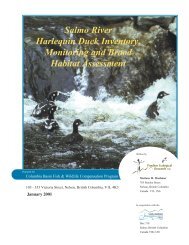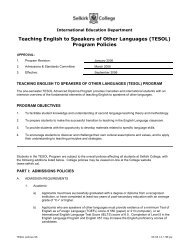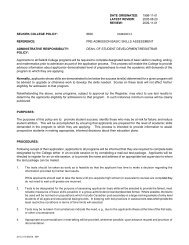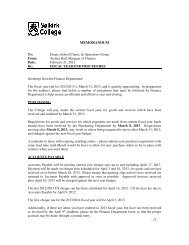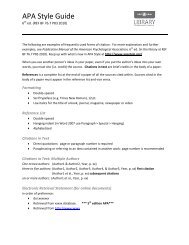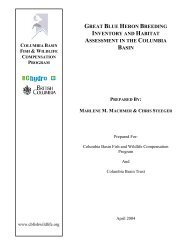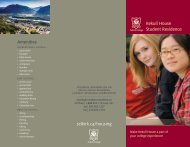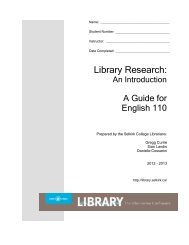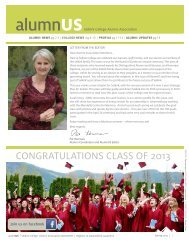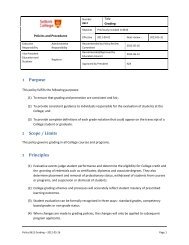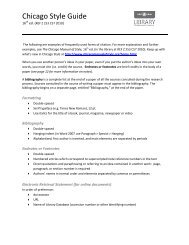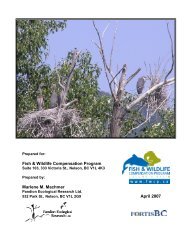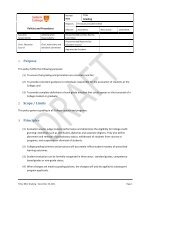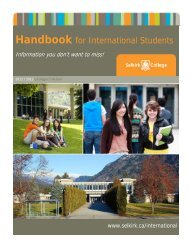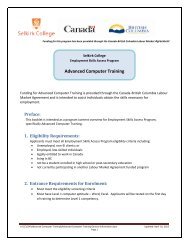selk irk.ca - Selkirk College
selk irk.ca - Selkirk College
selk irk.ca - Selkirk College
Create successful ePaper yourself
Turn your PDF publications into a flip-book with our unique Google optimized e-Paper software.
ski resort operations and management<br />
preventative maintenance of the building systems<br />
that provide for the needs and comfort of guests<br />
and employees.<br />
SROM 166 Ski Resort Facilities Maintenance<br />
is presented to give students an insight into<br />
the complexity of ski resort base area building<br />
infrastructure. The necessity for effective<br />
maintenance and preventative maintenance<br />
programs is inherent in the quality management<br />
of these important ski resort assets.<br />
SROM 173 Ski Resort Slope<br />
Grooming Operations<br />
As with ski lift technology, the evolution of slope<br />
grooming machinery and slope maintenance<br />
practices has profoundly affected the ski industry.<br />
As numerous ski industry customer service<br />
surveys indi<strong>ca</strong>te, snow conditions are a primary<br />
determinant of skier satisfaction. Thus, slope<br />
grooming technology and operations play a major<br />
role in providing a high quality skiing experience<br />
and creating high levels of skier satisfaction.<br />
In SROM 173 you will study the basic design<br />
and functioning of slope grooming vehicles<br />
and implements designed specifi<strong>ca</strong>lly for the<br />
ski industry, particularly the slope grooming<br />
machines supplied by the two major slope<br />
grooming vehicle manufacturers, Kassboher and<br />
Prinoth. You will examine the main components<br />
and general maintenance requirements of a slope<br />
grooming vehicle, including the engine and its<br />
various systems, the tracks and suspension system,<br />
and the drive system. You will also study the<br />
main slope grooming implements including the<br />
blade system, snow tillers, and half pipe grinders.<br />
You will review grooming operations, including<br />
snow properties in relation to slope grooming,<br />
slope-grooming objectives and functions, slope<br />
grooming methods and techniques, slope<br />
grooming operating plans, and slope grooming<br />
expenses and budgeting. Slope grooming human<br />
resources management topics include operator<br />
training, motivation, and compensation.<br />
Practi<strong>ca</strong>l sessions will allow you to examine<br />
grooming equipment in the field, and you will<br />
have the opportunity to participate in on one or<br />
more “ride-along” sessions at Whitewater<br />
ski area. By the end of the course, you will<br />
have gained some understanding of how slope<br />
grooming personnel <strong>ca</strong>n run efficient and cost<br />
effective grooming operations.<br />
SROM 175 Snowmaking<br />
Systems Operations<br />
SROM 175 introduces you to the various<br />
components of ski resort snowmaking systems and<br />
accepted concepts, principles, and operational and<br />
management practices for machine snowmaking<br />
for the snow resort industry. You will learn about<br />
the physics and mechanics of snowmaking and<br />
its uses within a snow resort context, as well as its<br />
impacts on mountain resort operations and resort<br />
costs of operation. You will study snowmaking<br />
system components, including snow guns, water<br />
pumps and air compressors, system infrastructure,<br />
and system controls. You will also examine ski<br />
area snowmaking system design, operational<br />
practices, snowmaking <strong>ca</strong>pital and operating costs,<br />
and methods for improving the energy efficiency<br />
of ski resort snowmaking operations.<br />
SROM 184 Snow Safety/<br />
Ski Patrol Operations<br />
During SROM 184 you will review the primary<br />
management issues and operational activities of<br />
the snow safety or ski patrol department, with a<br />
focus on managing avalanche hazards. You will<br />
examine the major elements of ski resort avalanche<br />
hazard assessment and safety including avalanche<br />
terrain, mountain weather, snow pack features,<br />
and avalanche rescue. As part of your study of<br />
avalanche hazards and safety, you will have the<br />
opportunity to complete the Canadian Avalanche<br />
Centre (CAC) Avalanche Skills Training (AST)<br />
Level I course which involves two full days of field<br />
study. In addition to examining avalanche hazard<br />
concerns and issues, you will study several snow<br />
safety/ski patrol operations and management<br />
topics, including avalanche hazards and ski area<br />
planning, ski resort avalanche control, ski patrol<br />
operations, ski resort accident investigation and<br />
recording, ski lift evacuation, and ski patrol<br />
facilities and equipment.<br />
SROM 190 Field Study<br />
This course consists of a five day credit bearing<br />
field trip to visit ski areas. Although venues change<br />
from year to year, it typi<strong>ca</strong>lly includes major ski<br />
resorts and regions throughout western Canada.<br />
The purpose of this visit is to talk with ski area<br />
managers and supervisors, on lo<strong>ca</strong>tion, about their<br />
operations and to inspect those operations. Often<br />
the ski area visit provides “hands-on” supplements<br />
to the contents of on-going SROM courses and<br />
involve field work assignments. This trip provides<br />
an excellent opportunity for <strong>ca</strong>ndid conversations<br />
with ski industry personnel from general managers<br />
to line staff, as well as an excellent opportunity to<br />
examine facilities and equipment.<br />
SROM 251 Ski Area Marketing<br />
and Special Events<br />
In today’s competitive recreation and tourism<br />
marketplace, competent ski area operators<br />
understand the essential role marketing plays<br />
in keeping ski lifts, <strong>ca</strong>feterias and lodges busy.<br />
In SROM 251 you will explore how ski resorts<br />
use primary and secondary market research,<br />
advertising media, the Internet, brochures,<br />
consumer ski shows and news releases to boost<br />
skier visits. You will also examine the important<br />
role of special events and you will learn event<br />
management practices. As much as possible, you<br />
will apply your studies to hands-on projects that<br />
allow you some direct experience in applying<br />
marketing concepts and methods to actual ski<br />
resort <strong>ca</strong>se studies and/or projects that offer direct<br />
involvement with ski resort marketing and event<br />
management activities.<br />
SROM 254 Ski Area fOOD and<br />
Beverage Administration<br />
This course provides an overview of food and<br />
beverage operations with major emphasis on<br />
ski area operations. Students learn how to<br />
utilize effective cost controls for the operations.<br />
Menu development and analysis as well as basic<br />
layouts for food and beverage areas are studied<br />
including an emphasis on <strong>ca</strong>feteria (mass feeding)<br />
operations.<br />
SROM 256 Ski Area Budgeting<br />
and Business Management<br />
The material covered in Ski Area Budgeting and<br />
Business Management will introduce students<br />
to the analysis of financial data for a standard<br />
Income Statement and Balance Sheet. Financial<br />
ratios that are normally used to predict the<br />
business health of a ski resort will be covered.<br />
Using CVP numeri<strong>ca</strong>l analysis, students will learn<br />
the impact of future proposed financial changes<br />
on the fis<strong>ca</strong>l health of a ski resort’s finances.<br />
Problem solving will help students to understand<br />
these financial concepts. Creation of budget<br />
templates on EXCEL spreadsheets for ‘wages and<br />
salaries’, and ‘departmental contribution margin’<br />
will round out the course content<br />
SROM 258 Human Resources<br />
Management for the<br />
Resort Industry<br />
As labour markets tighten around the globe,<br />
good human resources management is essential<br />
to attracting and retaining effective staff. This is<br />
particularly true in seasonal resorts and ski areas<br />
where the link between staff and the guest is so<br />
criti<strong>ca</strong>l. Innovative approaches to human resources<br />
management are necessary to recruit and retain the<br />
right people in the industry. In this course you will<br />
focus on the criti<strong>ca</strong>l issues that concern managers<br />
in the tourism industry: human resource planning,<br />
recruitment and selection, orientation, training<br />
and development, performance management<br />
and progressive discipline, challenges and trends,<br />
employment standards and labour relations.<br />
SROM 272 Ski Lift Operations<br />
SROM 272 is a continuation of SROM 172. Ski<br />
lift operational considerations are the primary<br />
focus of this course. You will learn about lift<br />
<strong>ca</strong>pacity, standard and emergency operating<br />
School of Hospitality and Tourism<br />
Selk<strong>irk</strong> <strong>College</strong> 12/13<br />
143



